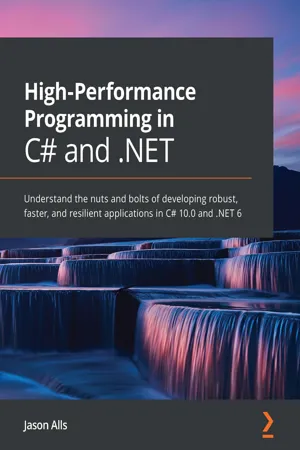
High-Performance Programming in C# and .NET
Understand the nuts and bolts of developing robust, faster, and resilient applications in C# 10.0 and .NET 6
- 660 pages
- English
- ePUB (mobile friendly)
- Available on iOS & Android
High-Performance Programming in C# and .NET
Understand the nuts and bolts of developing robust, faster, and resilient applications in C# 10.0 and .NET 6
About this book
Enhance your applications' performance using best practices for benchmarking, application profiling, asynchronous programming, designing responsive UIs, gRPC communication, and distributed applications
Key Features
- Make the best use of performance enhancements in C# 10.0 and.NET 6
- Boost application performance by identifying hardware bottlenecks and common performance pitfalls
- Get to grips with best practices and techniques for improving the scalability of distributed systems
Book Description
Writing high-performance code while building an application is crucial, and over the years, Microsoft has focused on delivering various performance-related improvements within the.NET ecosystem. This book will help you understand the aspects involved in designing responsive, resilient, and high-performance applications with the new version of C# and.NET.
You will start by understanding the foundation of high-performance code and the latest performance-related improvements in C# 10.0 and.NET 6. Next, you'll learn how to use tracing and diagnostics to track down performance issues and the cause of memory leaks. The chapters that follow then show you how to enhance the performance of your networked applications and various ways to improve directory tasks, file tasks, and more. Later, you'll go on to improve data querying performance and write responsive user interfaces. You'll also discover how you can use cloud providers such as Microsoft Azure to build scalable distributed solutions. Finally, you'll explore various ways to process code synchronously, asynchronously, and in parallel to reduce the time it takes to process a series of tasks.
By the end of this C# programming book, you'll have the confidence you need to build highly resilient, high-performance applications that meet your customer's demands.
What you will learn
- Use correct types and collections to enhance application performance
- Profile, benchmark, and identify performance issues with the codebase
- Explore how to best perform queries on LINQ to improve an application's performance
- Effectively utilize a number of CPUs and cores through asynchronous programming
- Build responsive user interfaces with WinForms, WPF, MAUI, and WinUI
- Benchmark ADO.NET, Entity Framework Core, and Dapper for data access
- Implement CQRS and event sourcing and build and deploy microservices
Who this book is for
This book is for software engineers, professional software developers, performance engineers, and application profilers looking to improve the speed of their code or take their skills to the next level to gain a competitive advantage. You should be a proficient C# programmer who can already put the language to good use and is also comfortable using Microsoft Visual Studio 2022.
Frequently asked questions
- Essential is ideal for learners and professionals who enjoy exploring a wide range of subjects. Access the Essential Library with 800,000+ trusted titles and best-sellers across business, personal growth, and the humanities. Includes unlimited reading time and Standard Read Aloud voice.
- Complete: Perfect for advanced learners and researchers needing full, unrestricted access. Unlock 1.4M+ books across hundreds of subjects, including academic and specialized titles. The Complete Plan also includes advanced features like Premium Read Aloud and Research Assistant.
Please note we cannot support devices running on iOS 13 and Android 7 or earlier. Learn more about using the app.
Information
Table of contents
- High-Performance Programming in C# and .NET
- Contributors
- Preface
- Part 1: High-Performance Code Foundation
- Chapter 1: Introducing C# 10.0 and .NET 6
- Chapter 2: Implementing C# Interoperability
- Chapter 3: Predefined Data Types and Memory Allocations
- Chapter 4: Memory Management
- Chapter 5: Application Profiling and Tracing
- Part 2: Writing High-Performance Code
- Chapter 6: The .NET Collections
- Chapter 7: LINQ Performance
- Chapter 8: File and Stream I/O
- Chapter 9: Enhancing the Performance of Networked Applications
- Chapter 10: Setting Up Our Database Project
- Chapter 11: Benchmarking Relational Data Access Frameworks
- Chapter 12: Responsive User Interfaces
- Chapter 13: Distributed Systems
- Part 3: Threading and Concurrency
- Chapter 14: Multi-Threaded Programming
- Chapter 15: Parallel Programming
- Chapter 16: Asynchronous Programming
- Assessments
- Other Books You May Enjoy